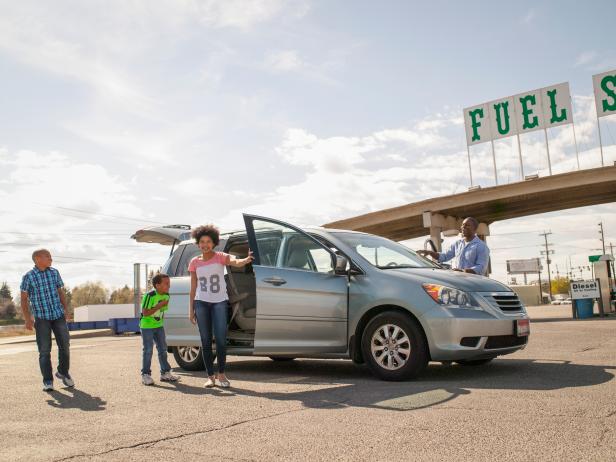Minivan Third Rows May Not be Safe for Kids — New Report Finds
Here’s what parents need to know about kids sitting in the second and third row.


Tony Anderson
For many families, the minivan has become a rite of passage. Once you have a few kids, it’s time to get a larger vehicle, and the minivan has so many features that make traveling with kids a lot easier: plenty of legroom, seats for everyone in the family, and sliding doors that make it easy for kids to get in and out of the vehicle — with the touch of a button. While many models of minivans boast their long list of safety features, a new report warns parents that the second and third row may not be as safe as they could be for younger passengers
According to the Insurance Institute for Highway Safety (IIHS), none of the models of minivans tested earned an acceptable or good rating in the crash testing for back seat safety. The agency rates vehicles as "good," "acceptable," "marginal," or "poor" based on the likelihood of injuries to the driver or passenger. The IIHS tested the Chrysler Pacifica, Kia Carnival, and Toyota Sienna, which all received a rating of marginal, and the Honda Odyssey was rated poor.
"Back seat safety is important for all vehicles, but it’s especially vital for those, like minivans, that customers are choosing specifically to transport their families," IIHS President David Harkey said in a statement about the research. "It’s disappointing that automakers haven’t acted faster to apply the best available technology to the second row in this vehicle class."
According to Harkey, the IIHS launched the study after research showed "in newer vehicles the risk of a fatal injury is now higher for belted occupants in the second row than for those in front." He adds that the front seat has become the safer seat because of numerous additions like improved airbags. Front seats often have options like advanced seat belts that are rarely available in backseats. However, even with all of these extra features, the back seat remains the safest place for children because they can be injured by an inflating front airbag and the IIHS wants car manufacturers to make the back seats just as safe as the front seats.
For the study, the IIHS placed a dummy in the second and third row of each minivan. This dummy was the size and weight of an average 12 year old. For a minivan to earn a good rating, there can’t be an excessive risk of injury to the head, neck, chest, or thigh, and to avoid injuries to the abdomen, the dummy should remain correctly positioned during the crash and shouldn’t move or slide forward.
Once each of the four miniman models were tested, the results were disappointing.
"The restraint systems in all four vehicles leave the second-row occupant vulnerable to chest injuries, either because of excessive belt forces or poor belt positioning," said Jessica Jermakian, IIHS vice president of vehicle research. "That’s concerning because those injuries can be life-threatening."
So, what should parents do with this information? When looking for a new vehicle, be sure to read reviews from organizations like the IIHS and the National Highway Traffic Safety Administration (NHTSA) and make your decisions based on safety measures for front and rear crash testing.
While experts say it’s up to the car manufacturer to step up their designs and make these second and third row seats safer, parents can make sure that their younger children stay in car seats and booster seats until they reach the correct height and weight limits and ensure all passengers are wearing a seatbelt.
YOU MIGHT ALSO LIKE:















